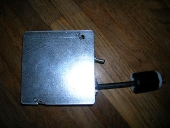

 10
10




Failure is a sign of activity and learning. It had nothing to do with under achievement
I never want to have a team member who has never failed - They are not doing!! 👍
 6
6




Moderator, Treatment Free Beekeepers group on Facebook.
https://www.facebook.com/groups/treatmentfreebeekeepers/





 5
5




Learning slowly...
How permies.com works
 10
10




The best place to pray for a good crop is at the end of a hoe!
 7
7




A short circuit will fully discharge a huge amount of energy in an instant - potentially a lethal discharge
Argue for your limitations and they are yours forever.
 3
3




 4
4




 2
2




Iterations are fine, we don't have to be perfect
My 2nd Location:Florida HardinessZone:10 AHS:10 GDD:8500 Rainfall:2in/mth winter, 8in/mth summer, Soil:Sand pH8 Flat
 2
2




James Alun wrote:Another big problem is self-discharge. After a few days a supercapacitor will still have enough juice to kill but not enough to do anything useful.
 1
1




Argue for your limitations and they are yours forever.
 1
1




Mike Barkley wrote:That is called bleeder resistor. It is a common safety feature of power supplies. There is no need to wire it through a switch but you would probably need a much higher value resistor to avoid loading the power supply down.
 1
1




Argue for your limitations and they are yours forever.
 1
1




 2
2




Be the shenanigans
you want to see in the world.



 4
4




Iterations are fine, we don't have to be perfect
My 2nd Location:Florida HardinessZone:10 AHS:10 GDD:8500 Rainfall:2in/mth winter, 8in/mth summer, Soil:Sand pH8 Flat
 5
5




The best place to pray for a good crop is at the end of a hoe!

| I agree. Here's the link: http://stoves2.com |



